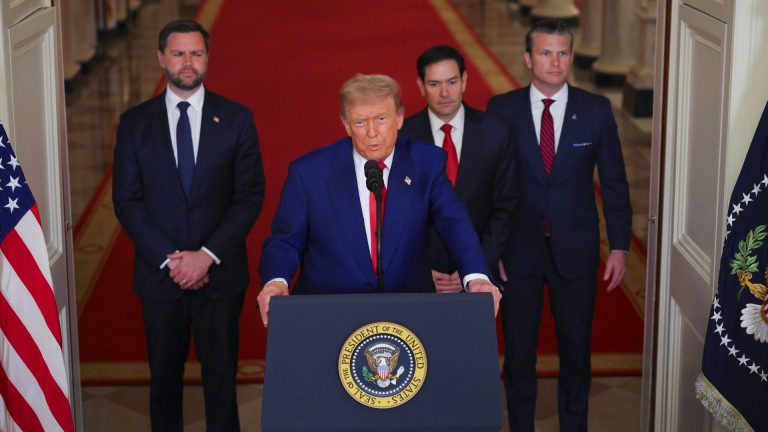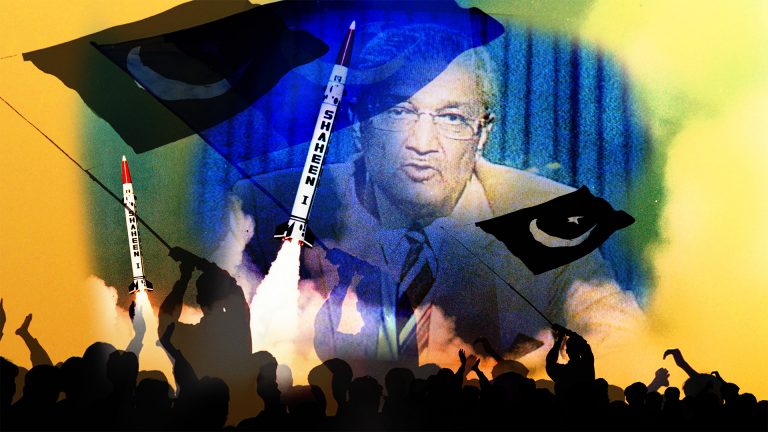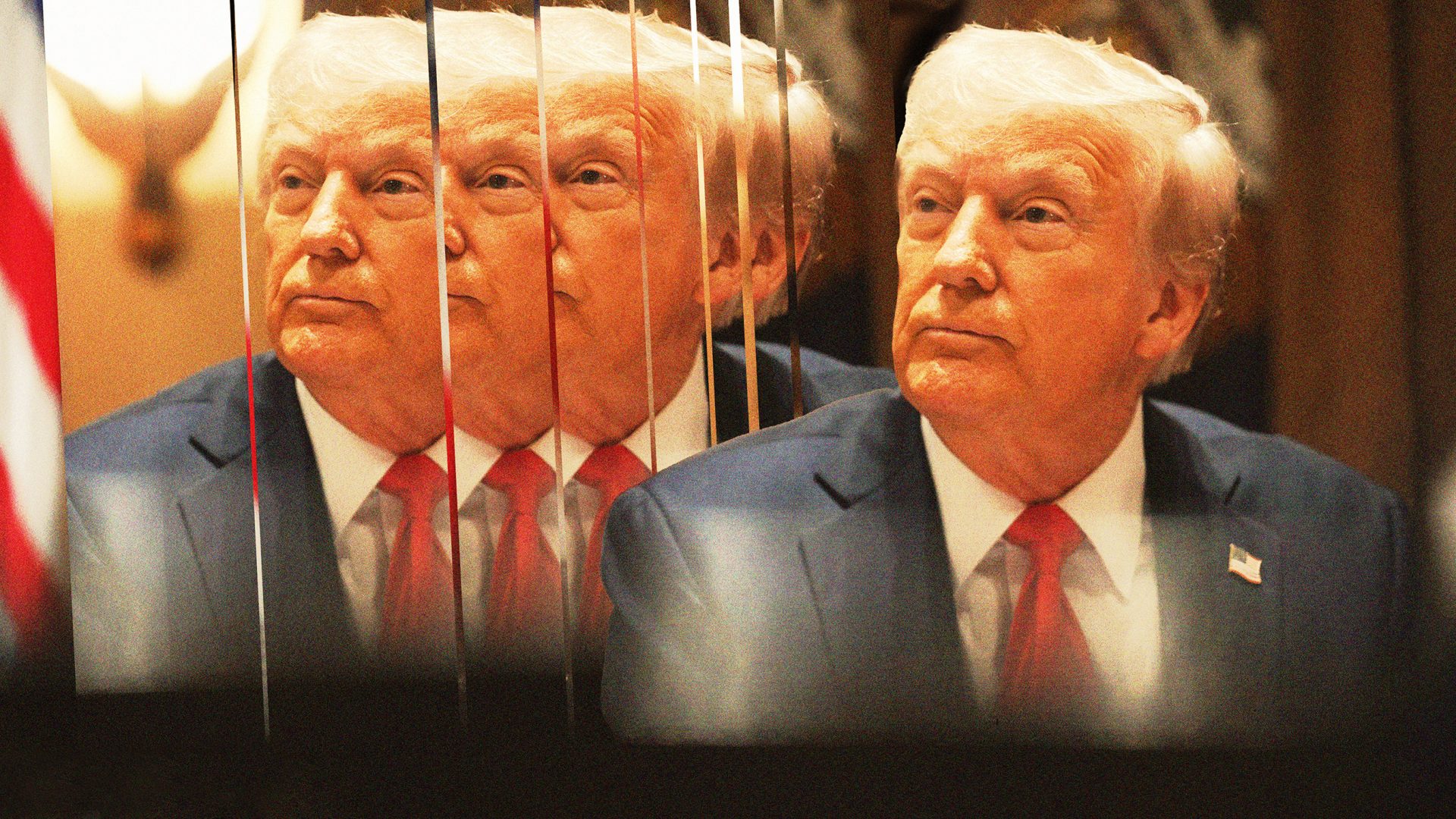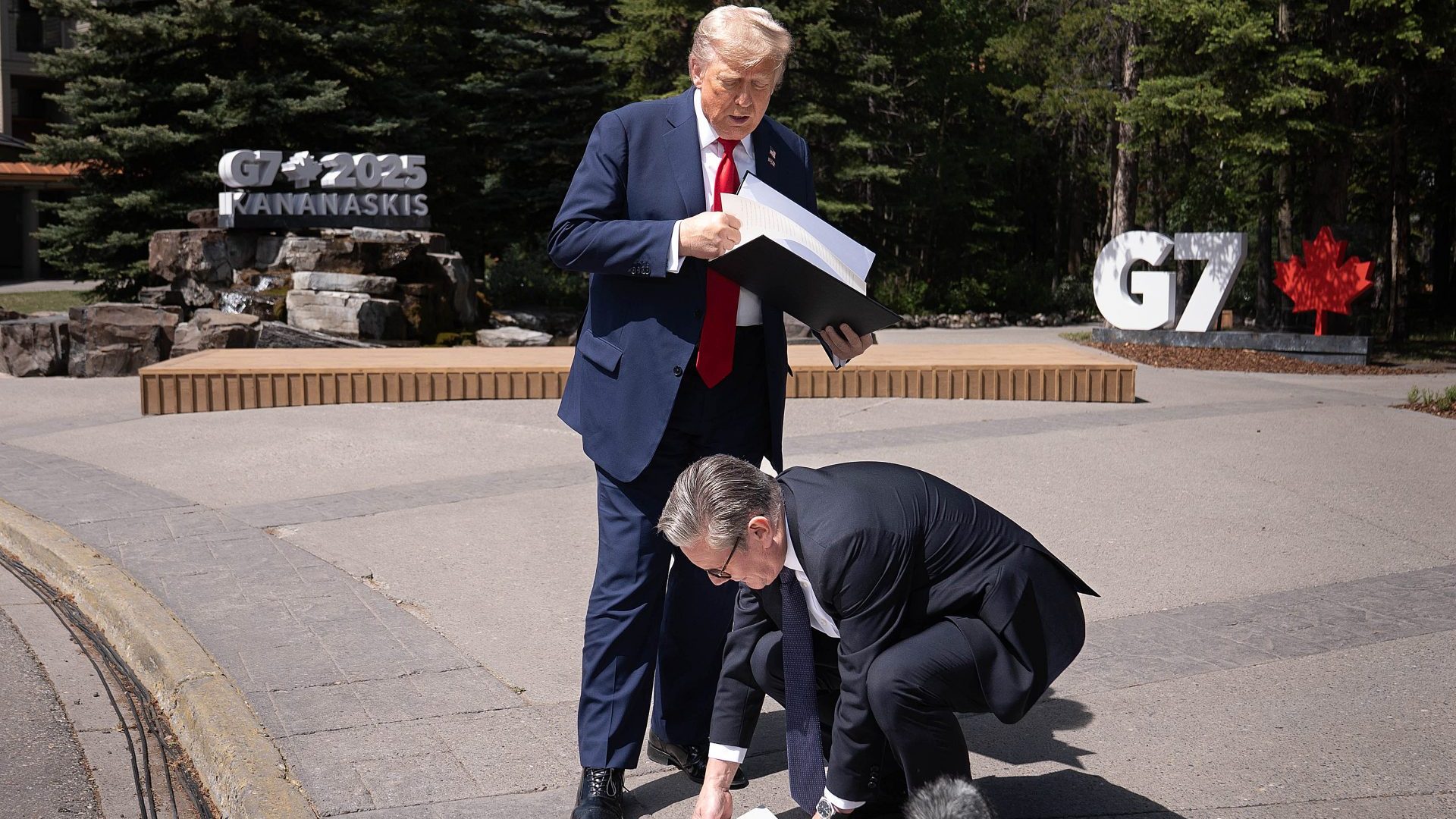If in doubt, go back to the speech that started it all. A decade ago, on June 16, 2015, Donald Trump descended the golden escalator at the Manhattan tower that bears his name to announce his presidential candidacy.
What followed was a 45-minute stream of consciousness – the prototype of the Trump “weave” – in which he lurched from issue to issue, firing off denunciations, bigoted slurs and irrelevant anecdotes. The transcript is almost unreadable. It is not so much an exercise in political rhetoric as the unleashing of a frenzied id.
But, in the verbal foliage, most of what has preoccupied Trump in the ensuing ten years is foreshadowed: tariffs, hostility to China, illegal immigration, the flight of manufacturing from the US, the uselessness of American dealmakers, the betrayal of “the brand of the United States”. And, to an extent that was scarcely noticed at the time, there is a fixation with Iran.
The Iraq war, he declared, had been a grievous error because it had benefited the wrong nation. “Iran is going to take over the Middle East,” he claimed to have warned the military. “Iran and somebody else will get the oil, and it turned out that Iran is now taking over Iraq. Think of it. Iran is taking over Iraq, and they’re taking it over big league”. All this would end, he promised. “I will stop Iran from getting nuclear weapons”.
At the time, Trump was barely taken seriously as a reality show presenter, much less as a presidential candidate. So it is no surprise that these words have (mostly) been forgotten. But – ten years on, five months into his second presidency – they should command our attention, as we survey the geopolitical landscape after Operation Midnight Hammer; the assault on Saturday night by 125 US aircraft on Iran’s nuclear facilities at Fordow, Natanz and Isfahan.
As General Jim Mattis, Trump’s first defense secretary, likes to say: “The most important six inches on the battlefield is between your ears”. Right now, as the world contemplates a series of terrible unknowns, it matters greatly what, if anything, is going on between the ears of the president.
Back in 2015, what bugged him most, as always, was the sense that the US had been conned, fleeced and taken for a ride: in this case, by the mullahs of Tehran. Throughout his first term, he took continual and personal exception to the actions of the Iranian regime, withdrawing the US from Barack Obama’s nuclear deal in May 2018 and shifting to a policy of “maximum pressure”.
In January 2020, General Qasem Soleimani, commander of the Quds Force of the Islamic Revolutionary Guard Corps, was assassinated by American MQ-9 Reaper drones. Trump warned that if Ayatollah Khamenei retaliated, he would destroy 52 Iranian sites – a historical allusion to the number of hostages seized at the US embassy in Tehran by Islamic revolutionaries in 1979.
As in military action, so in diplomacy: the negotiations led by Trump’s son-in-law, Jared Kushner, with Israel, Jordan, Egypt, Oman, Qatar, Bahrain, Kuwait, the United Arab Emirates, and, above all, Saudi Arabia were driven by the quest for a regional security and commercial coalition that would stand in opposition to Iran and its terrorist proxies. If there was a strand of continuity to Trump’s often deranged foreign policy, it was his desire to isolate and disarm the mullahs.
Which is emphatically not to say that his momentous new war is the consequence of a decade’s deliberation. Trump’s cognitive processes can be likened to a lottery ball machine. You never really know what number is going to pop out of the slot. Think of Walt Whitman’s immortal line – “Do I contradict myself? Very well then I contradict myself” – but delivered by Jim Carrey and Jeff Daniels in Dumb and Dumber.
It is also important to parse Trump according to the grammar of entertainment rather than statesmanship. What matters to this president is not policy planning, evidence-gathering and rational decision-taking; but suspense, conflict, spectacle and ratings.
Hence his manic zigzag in the days since the Israelis launched their bombardment of Iran’s nuclear sites on June 13. Initially, Trump was frosty about Benjamin Netanyahu’s actions, despatching his secretary of state and national security advisor Marco Rubio to describe Israel’s Operation Rising Lion as “unilateral”.
But no compulsive showman likes to be left out of the main event and, once Trump saw how effective the initial Israeli attacks had been, he wanted in. He had also been publicly affronted by the newly coined “TACO” acronym (“Trump Always Chickens Out”).
“Oh, I chicken out? Isn’t that nice? I’ve never heard that,” he said to reporters in the Oval Office on May 28. What better way to put that particular charge to bed than with the most heavily armed B-2s in history?
Suggested Reading

Trump bombs Iran. Now chaos is coming
So began a positively camp flirtation with the media over his intentions: would he or wouldn’t he send stealth bombers carrying the 30,000-pound “Massive Ordnance Penetrator” bunker buster to destroy Iran’s underground nuclear sites? Oh, but that would be telling. “Stay tuned!” he posted on Truth Social on June 17, like a television showrunner teasing a new season.
Two days later, his press secretary Karoline Leavitt announced what amounted to a pause. The president’s new position was that he would “make my decision whether or not to go within the next two weeks”.
After Trump disclosed the US attacks on Saturday night, the media was briefed that his decision had, in fact, been taken on the day before Leavitt’s statement; all part of a cunning plan to fool Tehran. But I am not sure I buy that.
Trump is driven by caprice, whim and impulse, not a master of disciplined strategies. It is just as plausible that, between June 19 and June 21, he got bored with the “two-week” plan and decided to get down to the bombing immediately.
And even then, he was more than capable of cancelling the operation at the very last moment. This, after all, is precisely what he did in June 2019 after Iran shot down a US surveillance drone. The planes were in the air to launch a retaliation when Trump aborted the mission. By way of explanation, he tweeted: “We were cocked & loaded to retaliate last night on 3 different sights [sic] when I asked, how many will die.”
What is certainly misconceived is the idea that Trump has suddenly metamorphosed from one sort of politician into another. For a start, he was never a pacifist: in April 2017, he struck Syria with cruise missiles after the Assad regime deployed chemical weapons. His campaign against ISIS was brutally relentless. As recently as February he ordered air strikes on that terrorist group in Somalia; and – the following month – on the Houthis in Yemen.
True, he has long opposed the “forever wars” that followed 9/11 in Iraq and Afghanistan. In Riyadh on May 13, he scorned “the so-called nation-builders, neocons [and] liberal nonprofits” who devised the narrative of the war on terror.
Suggested Reading

The father of Iran’s nuclear programme
In the days leading up to the attack on Iran, the MAGA movement suffered something like a collective nervous breakdown, triggered by Trump’s public indecision. In essence, Fox News – still the president’s favoured window onto the world – championed attack; while the loose-knit network of right wing shows known as “Podcastistan” mostly opposed intervention.
On Fox, Sean Hannity and Mark Levin have been the most prominent hawks. Among the big-league podcasters, Tucker Carlson and Steve Bannon are adamantly hostile to foreign entanglement. Indeed, in a conversation posted on June 17, the two nationalists managed to persuade one another that the plan to attack Iran was merely the latest iteration of a deep state plot to maximise US military activity abroad that could be traced back to the assassination of John F Kennedy in 1963.
The president was both irritated and amused by all this. “I don’t know what Tucker Carlson is saying,” he said at the G7 summit in Kananaskis, Canada. “Let him go get a television network and say it so that people listen”. Last Thursday, Trump had lunch with Bannon, his former chief strategist.
In his own mind, at any rate, he is not proposing another forever war: very far from it. As soon as the US operation was disclosed, the White House briefed that the president’s intention, as long as the Iranians complied with his demands to make an acceptable deal, was to confine himself to a single night of fire and fury: “one and done”.
This is true to the extent that he has no interest in the fate of the Iranian people, or (least of all) putting US troops on the ground. The neocons of George W Bush’s presidency believed that Jeffersonian democracy could be parachuted into nations where authoritarian regimes had been toppled. Trump has nothing but contempt for this particular ideology and the underpinning conviction that America should remain the guarantor of the global liberal order.
During this crisis, he has insisted to the press that “I think I’m the one that decides” what “America First” means. But it is a mistake to confuse that familiar maxim with absolute isolationism.
As I wrote two weeks ago, William F Buckley, the father of modern US conservatism, was a fervent believer in “America First” as a fundamental principle and, as an excited schoolboy, went to see Charles Lindbergh at Madison Square Garden in 1941. But – so evil did he consider Soviet communism to be – Buckley was also prepared to suspend his commitment for the duration of the Cold War.
“America First”, in other words, has always come with the all-important footnote that the interests of the nation may occasionally involve exceptional acts of intervention. This is one such moment, Trump believes. As far as he is concerned, a few hours of targeted destruction do not reverse the broader retreat of the US from the world stage.
Nor should we forget the ulterior motives that so often lurk beneath his actions. As The Atlantic’s Robert Kagan shrewdly pointed out only hours before the attack, it would suit this president very well indeed to have the option of domestic war powers at his disposal.
“Trump declared a state of national emergency in response to a nonexistent ‘invasion’ by Venezuelan gangs,” wrote Kagan. “Imagine what he will do when the United States is actually at war with a real country, one that many Americans fear”. He has, after all, declared no fewer than eight national emergencies to date. Why not a ninth?
In support of Kagan’s warning, it is worth noting that General Mark Milley, former chairman of the joint chiefs of staffs – whose security detail Trump spitefully withdrew in January – was fretful in the period between the 2020 election and Joe Biden’s inauguration that the defeated president would manufacture a war with Iran to prevent the orderly transfer of power.
According to The Divider (2022), by Peter Baker and Susan Glasser, Milley believed that his boss might “create a pretext for a power grab at home”. Aware that Trump’s advisers had discussed going to war with Iran if he lost, Milley personally visited Netanyahu at his home in Jerusalem on December 18, 2020 to urge him in the strongest terms not to encourage such a plan.
Now, in very different circumstances, Trump is back in the White House and seeking autocratic power once more. He appears confident that his attack on Iran has gone to plan and that the aftermath will be swift and tidy.
Like all narcissists, he believes that he can mould reality to suit his wishes. But, when it comes to the blood and iron of warfare, reality is rarely obliging.
Remember the military axiom usually attributed to the 19th century Prussian chief of staff, Helmuth von Moltke: No plan survives first contact with the enemy. And, in this case, is there even a plan worthy of the name?
On Sunday at 9:22pm, Trump posted on Truth Social, directly undermining assurances offered by vice-president JD Vance and defense secretary Pete Hegseth: “It’s not politically correct to use the term, “Regime Change,” but if the current Iranian Regime is unable to MAKE IRAN GREAT AGAIN, why wouldn’t there be a Regime change??? MIGA!!!” This conduct is beyond erratic. It is unpredictability as a way of life.
The surges of dopamine presently coursing through the president’s neural system are no guide to the grave uncertainties of the days and weeks ahead. Once again, the demented Trump timeline has split, as it did when an assassin’s bullet clipped his ear in a field in Butler, Pennsylvania last July.
It is all but impossible to say how it will end, because it rarely ends the way you expect. Nobody chooses to get stuck in a quagmire; but, all too often, they do.
Today’s “one-and-done” can quite easily become tomorrow’s forever war. When the main protagonist is barely in control of himself, where does that leave the rest of us?




